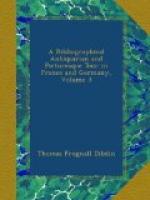A sort of sympathetic shouting succeeded; for, by this time, the whole of our party had reached the Abbot’s rooms. I now requested, to be immediately taken to the church; and within five minutes we were in the crypt. It scarcely merits one word of description on the score of antiquity; and may be, at the farthest, somewhere about three centuries old. The church is small and quite unpretending, as a piece of architecture. On quitting the church, and passing through the last court, or smaller quadrangle, we came to the outer walls: and leaving them, we discerned—below—the horses, carriage, and valet ... waiting to receive us. Our amiable Host and his Benedictin brethren determined to walk a little way down the hill, to see us fairly seated and ready to start. I entreated and remonstrated that this might not be; but in vain. On reaching the carriage, we all shook hands very cordially together, but certainly I pressed those of the Abbot more earnestly than the rest. We then saluted by uncovering; and, stepping into the carriage, I held aloft the first volume of the GOeTTWIC CHRONICLE—exclaiming ... “Valete, Domini eruditissimi: dies hic commemoratione dignus:” to which the Abbot replied, with peculiarly emphatic sonorousness of voice, “Vale: Deus te, omnesque tibi charissimos, conservet.” They then stopped for a moment ... as the horses began to be put in motion ... and retracing their steps up the hill, towards the outer gate of the monastery, disappeared. I thought—but it might not be so—that I discerned the Abbot, at the distance of some two hundred yards, yet lingering alone—with his right arm raised, and shaking it as the last and most affectionate token of farewell.
The evening was serene and mild; and the road, although a cross way, was perfectly sound—winding through a country of fertility and picturesque beauty. We saw few vineyards: but those which met our eyes showed the grape to be in its full purple tint, if not beginning to ripen. I had resolved upon stopping to sleep at Sirghartskirchen within two stages of Vienna—thus avoiding the post town of Perschling, which is situated in the direct road to Vienna from St. Poelten—which latter place, as you may remember, we had left in the morning. Before the darker shades of evening began to prevail, we turned round to catch a farewell glance of the hospitable monastery which we had left behind—and were lucky in viewing it, (scarcely less than seven or eight miles in our rear) just as the outline of its pinnacles could be discerned against a clear, and yet almost brilliant, sky.
It was quite dark, and nearer upon eleven than ten o’clock, when we entered the insignificant post town of Sirghartskirchen—where we stretched our limbs rather than reposed; and after a hasty, but not very ill provided breakfast, the next morning, we pushed on for Burkersdorf, the last post town on that side of Vienna. It may be about nine English miles from Burkersdorf to the capital; of which the greater part is rather agreeable than otherwise. It was here, as in approaching Strasbourg, that I turned my eyes in all directions to catch an early glimpse of the tower of St. Stephen’s Cathedral, but in vain. At length, to the right, we saw the magnificent chateau of Schoenbrunn.




